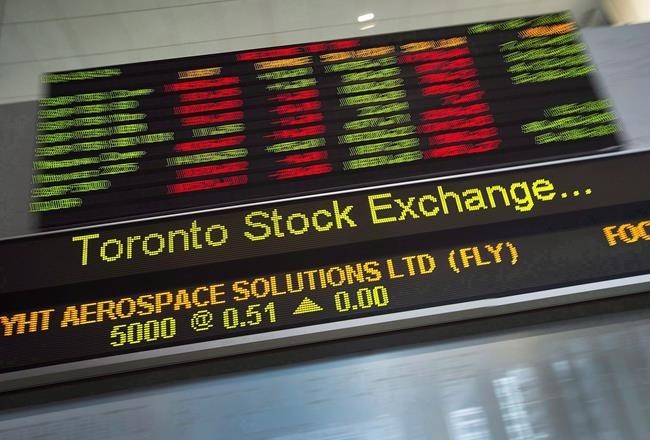TORONTO — A strong run for Canada's main stock index in the first half of 2021 isn't a signal for investors to panic and sell in anticipation of a major correction, experts advise.
"I think savvy investors are enjoying the ride," says Allan Small, senior investment adviser at IA Private Wealth.
With the S&P/TSX composite index up 16.4 per cent year-to-date, he's been fielding questions about how long the run can last.
"Investors sometimes just talk themselves out of the market altogether, even in good or bad times," he said in an interview.
But Small says he's not a fan of selling out, unless personal circumstances warrant such a move. Instead, he favours taking some profits and moving money to sectors or stocks that have not surged as much.
"If you continue to rotate money amongst different types of investments and not be greedy and trim your profits when you have them, I think that is the best way to protect on the way up because we all know that nothing goes up forever," he said.
"I think you have to enjoy this time, because you never know when the next downturn will happen and if you don't enjoy the good times, the bad times are all that more devastating."
North American stock markets have been on a tear since plunging in the spring of 2020 due to the impact of the COVID-19 pandemic. Easy money from monetary and fiscal stimulus has supported the moves to repeated record highs.
After surging in the first six months of the year, Small said the odds are probably not high that they'll increase another 15 per cent over the rest of the year.
"I think the gains are more muted in the second half of the year. I still think they'll be gains, but perhaps you end up coming in at maybe 20 or 22 per cent gains for the year, of which 15 per cent was the first half and only five or seven was the second half."
After a strong run and good returns preceding COVID, Small said some investors have grown complacent and "almost become numb" to anything but strong returns.
The ho-hum reaction is sad because these levels of market returns aren't common, he said, noting that the long-term average for the Toronto stock market is about seven per cent.
Canadian investors have emerged from COVID with lofty investment return expectations, says a survey from Natixis Investment Managers.
The survey of 8,550 investors globally including 300 in Canada, found that long-term expectations by Canadian investors are 15 per cent higher than before the pandemic began and two times more than the 5.1 per cent returns financial professionals say is realistic.
"However, investors need to be emotionally equipped to withstand the higher levels of risk needed to pursue those outsized returns," said Dave Goodsell, executive director of Natixis Investment Managers’ Center for Investor Insight.
The survey found that 71 per cent of respondents recognize sudden market swings of 10 per cent are normal and 69 per cent agree that volatility can create opportunities. Yet 56 per cent say they aren’t comfortable taking risks to get ahead, and 78 per cent would choose the safety of asset protection over investment performance.
Overall, 42 per cent of Canadian investors made changes in their investing accounts as a result of the pandemic, including 15 per cent who say they invested more money.
Canadians have been spending more on investments from an estimated $220 billion of savings resulting from reduced spending during COVID, along with help from government subsidies. And Canadian household net worth, including real estate holdings, has risen by $2 trillion during the pandemic to above $16 trillion, according to BMO chief economist Douglas Porter.
Meanwhile, a global survey of investment professionals bythe CFA Institute found that 44 per cent of Canadian members believe government stimulus measures have "created a gold mine for the investor class, widening the wealth gap in society."
A plurality of respondents globally have said equities have recovered too quickly from the market slump and are due for a correction within the next one to three years.
Good times are expected to continue at least until the end of 2022, when central banks could start to increase interest rates. But there have been recent signals that economic growth and market growth may be slowing.
Anish Chopra, managing director with Portfolio Management Corp., said investors are starting to anticipate a slowdown in growth and are making adjustments by paring back on cyclical stocks.
Chopra suggests investors have balanced portfolios that reflect their risk tolerances because it's hard to predict how the market will move.
"I don't think investors are nervous. I think they're just making a reassessment that higher amounts of growth going forward are going to come out of technology as opposed to cyclicals."
Most market observers are anticipating a little bit more choppiness in the second half of the year that will slow growth with the year likely ending with a bit of a rally.
"So we could see some volatility through the summer," says Colin Cieszynski, chief market strategist at SIA Wealth Management.
He said the situation requires investors to be more selective rather than waiting for "a rising tide to lift all boats" approach.
"This is a time that favours a little bit more active investing versus passive."
For longer-term investors, the best course of action is to just wait it out, he said, noting that even in a sideways market we are still hitting all-time highs and creeping upwards.
"So there might be the odd caution flags, but it's not screaming red flags where things are ridiculously overbought everything is going off the rails or anything like that."
This report by The Canadian Press was first published July 8, 2021.
Ross Marowits, The Canadian Press



